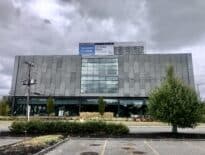
Jonathan Berk
I’m often asked by area business owners and residents, “What can we do to support solutions to our housing issues in our own communities?” The answer sometimes surprises people in its simplicity.
Beyond showing up to support ongoing rezoning efforts and development proposals in your own communities, my biggest ask is just a simple change in the way we speak about new housing.
We Bay Staters need to move away from referring to housing and new neighbors as a burden that needs to be mitigated and towards talking about them as benefits that our region cannot survive without. This ubiquitous “burden over benefit” mindset needs to be squashed if we ever hope to solve the housing insecurity and affordability issues we see today.
I’m not arguing that there are not legitimate logistical needs that arise with new development but, the overwhelming attitude in many communities is to approach even the idea of new housing with immediate opposition, not collaboration. The net benefits of new housing – new customers for small businesses, newly found housing security for area families, children and seniors and a boost to the municipal property tax base – far outweigh any of the perceived “burdens.”
Proposals Greeted with Conspiracy Theories
Proposals for new housing are met by many with incredulity towards experts, spread of wild conspiracy theories, misinformation about the facts and impacts of new housing and cries for intense and organized opposition aimed, not at mitigating, but stopping new housing in its tracks.
Opposition in some towns has so far seemed to ignore the facts, the nuts and bolts of the actual zoning reforms being proposed to meet MBTA Communities requirements and seems much more viscerally rooted in pure opposition to even the idea of new housing. In Marblehead, a presentation by the town’s own Planning Board at Town Meeting expressed that “these density limits and zoning requirements are unlikely to induce much new development,” yet opposition appeared to ignore those details, fighting against any and all reform.
The plans proposed by Marblehead and many other communities fall under what some are referring to as “paper compliance,” which meets the letter of the law but that will likely not result in any new housing created due to existing conditions and still-overly restrictive zoning requirements on properties in these updated districts that make development all but impossible.
That lack of realistic housing production is a problem for another time, but what the response to proposals like Marblehead’s shows is a much more sinister and problematic sentiment expressed by some of the most vocal opponents to even the idea of new housing: ignoring, or choosing to look past, the realities of these proposed housing plans, even when they do not actually contain plans for housing at all.
Flip the Script
So how can you help? Reframe the housing conversation among colleagues, friends, family and neighbors in your community.
First, our communities and our region cannot sustain based upon our current supply of housing and sprawling development patterns. We continue to add jobs, continue to innovate, continue to welcome new companies yet our housing production rates are half of what they were in the 1960s through the 1990s. One of the greatest threats to our region is the outmigration of the heart of our workforce, those between 26 and 44, who should be buying homes in this region and setting down permanent roots here but instead are fleeing for more affordable housing options elsewhere.
Encouraging more infill development in walkable and transit-rich areas provides new customers for the small businesses we know and love, improves a towns commercial tax base while realizing an increase in property tax revenue to fund increasing municipal budgets.
The housing needs of our growing private sector workforce aside, our nurses, teachers, police and firefighters and other frontline workers struggle to live in and near the communities they work and serve. Teacher contract disputes have swept the Bay State recently as communities find themselves with stagnant tax bases and an ever-increasing need to pay higher wages to enable workers to afford the ever-higher costs of housing.
Our housing supply is sized for family dynamics of the 1950s, not the flexible demands of a 21st-century commonwealth. A right-sizing of our housing supply in every community provides starter homes for young families or the option to age in place for our parents and older neighbors.
We’re in the midst of a severe housing shortage, one that is largely of our own making. We have the opportunity to build a commonwealth for the future, one designed for everyone. One that will strengthen existing community character while building a stronger regional economy by enabling those that make our region function, able to afford to set down comfortable roots here. If we ever hope to accomplish this, we need all of us to work together to shift the pervasive reactionary “no” attitude of some members of our communities to a “yes” or, at the very least, a “yes but how” mentality. Our region’s future depends on it.
Jonathan Berk is the founder of placemaking consultancy re:MAIN and a board member of Abundant Housing Massachusetts.






